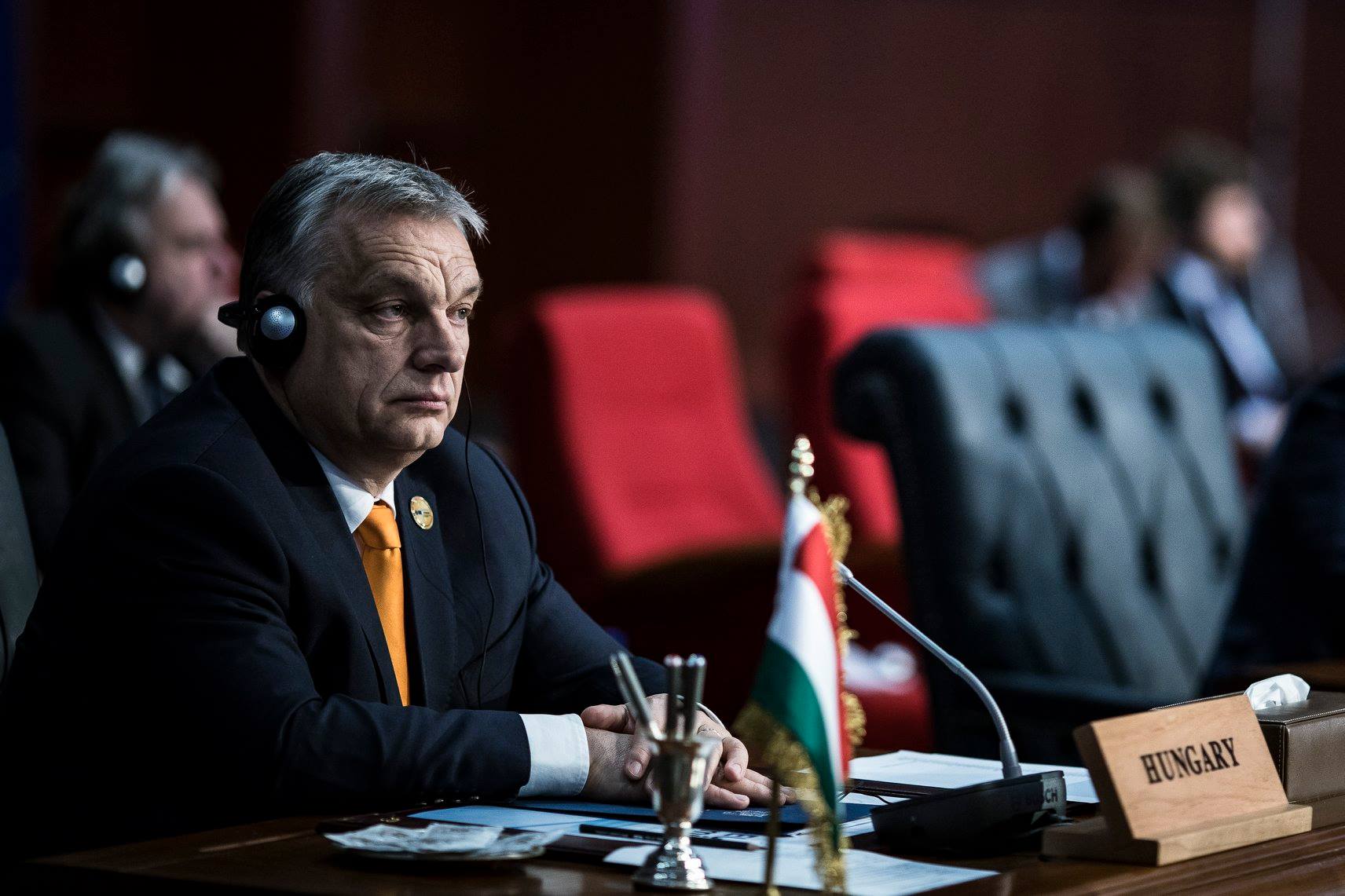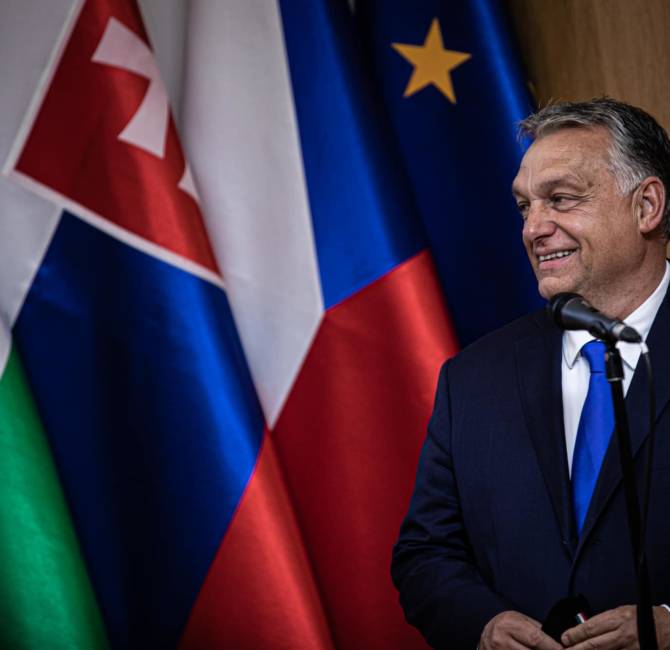Spain – A little less than two months after their summit in Warsaw, the parties that signed the Statement on the Future of Europe last July met on Friday and Saturday in Madrid at the invitation of the Vox party, to give shape to their cooperation in Brussels. Being unable to create a common group in the European Parliament before the next elections (notably because of disagreements between the two Italian right-wing parties), they decided during these meetings on 28 and 29 January to create a coordination office in order to “join forces” and vote together in the European Parliament on issues that are important to them. On the sidelines of this summit of European right-wing parties from ten countries (Spain, France, Belgium, Austria, Poland, Hungary, Romania, Bulgaria, Lithuania and Estonia), discussions were held between the four main leaders present: the Polish and Hungarian prime ministers Mateusz Morawiecki and Viktor Orbán, the leader of the Spanish liberal-conservative party Vox, Santiago Abascal, who hosted the meetings, and the leader of the French National Rally, Marine Le Pen.
These meetings, which are intended to be held regularly between several member parties of the Identity and Democracy group (among others: the National Rally, League and FPÖ – but without the German AfD) and the European Conservatives and Reformists group (among others: PiS, Vox and Fratelli d’Italia) in the European Parliament, as well as Fidesz, which has not yet joined any group since its exit from the EPP, also aim to provide
an alternative forum to the Conference on the Future of Europe desired by Emmanuel Macron, which consists of structured debates from which conservatives and supporters of a Europe of nations feel excluded.
The signal for the launch of such an alliance of right-wing parties in Europe was given by the signing of the Statement on the Future of Europe last July.
The Madrid Summit was the occasion for a new joint statement at the end of the discussions. In that statement, the participants define themselves as “patriotic and conservative forces in Europe” and announce “the organization of joint meetings and the vote alignment on common issues concerning the protection of the sovereignty of the Member States of the Union”.
The common positions adopted concern precisely the refusal to “transform the Union into an ideologically charged federalist super-state” and the desire to have “a Union focused on the common European values, on people, on their families, on the protection of their borders and on the freedom to have energy, industry, and a strong primary sector”, with a “culture of mutual respect among Member States and with the EU institutions, where constitutional identities are safeguarded and not criticized.”
In this regard, the statement’s signatories took care to denounce “the politically motivated attacks from Brussels against Poland and Hungary which demonstrate a complete disregard of basic EU principles and violate the spirit of the Treaties”, and to commit themselves to joining forces to “protect Europe from enforced ideologies and the anti-democratic drift that are leading to its downfall”.
They intend to “enforce the principle of EU preference” in order to support agriculture and industry in European countries; “denounce the immigration policy promoted by Brussels, and the ineffectiveness of FRONTEX”; “work for a European energy autonomy”, and this “while respecting the environment, but without submitting to the imposition of ideological prejudices”, which “contributes to unbearable energy prices”; “demand strict compliance with the Treaties in all cases and firmly reject any initiative that seeks to unduly extend the competences of the EU institutions”; “defend the primacy of national constitutions over European law, and of national laws over EU regulations in all matters that do not fall within the exclusive competence of the Union”; “intensify the return of all immigrants who enter EU territory illegally”, send back foreign criminals, and let asylum seekers enter EU territory only after they have been granted asylum.
At the insistence of Poland’s Mateusz Morawiecki, who knew he would be criticized at home for this summit with political leaders consistently labelled by liberals and the left as pro-Putin, a paragraph in the joint statement condemns Russia’s actions on the border with Ukraine and states that “solidarity, decisiveness and defence cooperation between the nations of Europe, as well as NATO and our transatlantic allies, are needed in the face of such threats”.
However, this paragraph is missing from the version published in French on the National Rally’s website, since Marine Le Pen did not wish to sign up to this part of the joint statement.
In the same vein, Morawiecki was due to visit Kiev on 1 February to discuss the Russian threat and Polish support for Ukraine, the day after it was announced Poland would send ammunition to Ukraine – the first time Poland is supplying that country with arms – while his Hungarian counterpart Viktor Orbán was due to visit Moscow on the same day to discuss Russian–Hungarian cooperation, particularly in the energy sector.
However, since the differences of opinion between Poland and Hungary do not prevent these two countries from maintaining a privileged relationship and their leaders from cooperating closely within the Visegrád Group, the differences between the leaders gathered in Madrid should not logically hinder their cooperation in the areas where they agree.
With this new summit, the Polish and Hungarian leaders confirm that they have taken note of the difficulty of working within the EU with leaders such as France’s Emmanuel Macron and Germany’s Olaf Scholz, both of whom favour a federal EU. For his part, with his 19 January speech in the European Parliament for the inauguration of the French presidency of the EU, the French president clearly indicated that he was choosing confrontation with Warsaw and Budapest.
The difficulty for the Polish and Hungarian leaders, however, is that their partners in the European Parliament are all in opposition. As far as France is concerned, we will find out in April whether they have bet on the right horse, but even if Éric Zemmour rather than Marine Le Pen were to defeat Macron in the presidential election, we can assume that, since the step to cooperation has been taken with the National Rally, which still seemed impossible only two or three years ago, it can also be taken with Zemmour and his newly created Reconquest party. As for centre-right presidential candidate Valérie Pécresse, the Polish and Hungarian leaders clearly do not expect that her victory would bring about a significant change in French policy.
On the Italian side, the absence of League leader Matteo Salvini and Fratelli d’Italia leader Giorgia Meloni in Madrid, just like two months ago in Warsaw, was all the more noticeable given that this conservative summit took place at a time when the two parties of the Italian right were tearing each other apart over the issue of left-wing President Sergio Mattarella’s re-election. Salvini and his party, which is part of the “national unity” government coalition of former ECB President Mario Draghi (a national unity without Fratelli d’Italia, which has remained in opposition), voted in favour, much to Meloni’s anger.
Finally, with regard to the major EU countries that have the ability to change the situation in Brussels, in Spain Santiago Abascal’s party, Vox, seems condemned to remain a minority grouping compared with the centre-right People’s Party (PP). Opinion polls, however, show that the PP will not be able to govern without Vox in the likely event it wins the next national elections, and Abascal’s party could therefore one day influence Spain’s European policy, even if it never has a majority itself.




